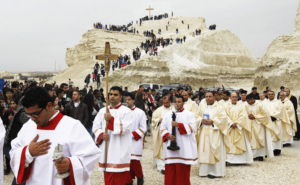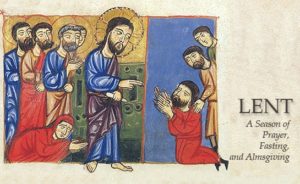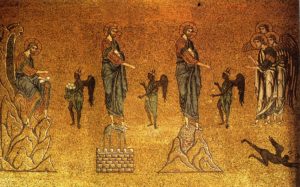
Another sacred pilgrimage begins!
‘Tis the season of…PFAP??

…and penance.
The season of Lent (“Springtime,” in Old English, “long day” in Germanic and “Tessarakonta” or “forty” in the original Greek) is my favorite time of the year, because it combines the best in our earthly and our religious calendars: increasing daylight and first flowers (I love to garden) and the highest holy days for Christians: the Passion, Death, Resurrection and Ascension of Jesus Christ.
We begin this season with a reminder of our mortality…


During my childhood at Our Lady of Sorrows elementary school in South Orange, NJ, the only message we heard from the priest while he marked our foreheads with ashes was, “Remember man that you are dust, and to dust you shall return.” The dark grit and solemn ritual gave a gravity to the day; but the toughest part was the “giving up” of something we valued (chocolate!), and we associated negativity with the season in sharp contrast with the building excitement and joy of Advent. That needed to change.
 During my adulthood, the faithful could hear an additional message from priest, deacon or minister: “Repent, and return to the Gospel.” While I like both exhortations to get one’s life back in proper order, the newer version gives a more direct message: we need to repent of our sins, and live as Jesus lived. We need to seek forgiveness, do penance and become reconciled with our Heavenly Father. The older message may be fine for an older population, as we (it used to be “they,” until I passed age 60!) can understand the implication of both the ashes and the message: you are much closer to ashes than to youth, so turn your life around before it’s too late! But by far the most important part of the Lenten message is, and should be, one of Joy, as indicated by the prayer said before the Masses of the season:
During my adulthood, the faithful could hear an additional message from priest, deacon or minister: “Repent, and return to the Gospel.” While I like both exhortations to get one’s life back in proper order, the newer version gives a more direct message: we need to repent of our sins, and live as Jesus lived. We need to seek forgiveness, do penance and become reconciled with our Heavenly Father. The older message may be fine for an older population, as we (it used to be “they,” until I passed age 60!) can understand the implication of both the ashes and the message: you are much closer to ashes than to youth, so turn your life around before it’s too late! But by far the most important part of the Lenten message is, and should be, one of Joy, as indicated by the prayer said before the Masses of the season:
“Each year you give us this joyful season
when we prepare to celebrate the paschal mystery
with mind and heart renewed.
You give us a spirit of loving reverence for you, our Father,
and of willing service to our neighbor.
As we recall the great events that gave us a new life in Christ,
you bring to perfection within us the image of your Son.”
That gift of “new life” waits for us; we only need to accept it.
***
The earliest mention of Lent occurred at the Council of Nicaea in 325 A.D. This is the same Council that produced the Nicene Creed, our great profession of faith we recite during Sunday Mass. Some very early Christians began celebrating Christ’s resurrection as “Easter” Sunday, and not long after that they instituted “Holy Week,” a preparatory period of a few days that remembered Christ’s passion and death. Ultimately, the “40” of Tessarakonta represented the number of days Jesus spent in the desert (Mt 4:1-2), a time during which he lived the PFA but not the P–he Fasted and Prayed, thereby preparing himself for the greatest Alms: himself. Since he was free from sin, he had no need for the “Penance.”
This preparation also helped Jesus face the greatest temptations; and unlike our first parents or the Israelites that went before him, he did not yield to them. Jesus remained obedient to the Father, not rebelling against him in pride (our first sin). Those forty days recalled the same period Moses spent on Sinai, and the wilderness period during which Israel wandered in the desert while facing temptations. The dark lord attempted to break Jesus’ spirit, one that was presumably vulnerable by dint of its vessel having been weakened from a long period without food or drink.

We know who won.
The devil lurks in many aspects of our lives, repeatedly prodding us with temptations in order to find our soft spots–our vulnerabilities–in his ongoing effort to lead us to sin (“Father, lead us away from temptation!”). Therefore during our 40 days in the wilderness, we must train ourselves in the spiritual disciplines of our ancient ancestors, our faith relatives, in order to become more spiritually fit so that we can ward off those temptations. I’ve often said that we should exercise spiritually in ways similar to how we train ourselves physically, intellectually and nutritionally, so we’re ready for the “tests;” and the PFAP “cross-training” program makes us ready because:
Prayer, improves our communication and relationship with our God: Father, Friend and Counselor
Fasting, makes us hunger and rely on the Bread of Life
Almsgiving, shares our love with others and brings them joy
Penance, teaches us humility to accept responsibility for our failures, and to make amends
So although we continue the tradition of “give-up” for Lent, we change the emphasis to the understanding that we are learning to loosen our attachments–our addictions, as Bishop Robert Barron has said–to the things of this world and break their hold on us. Our sin is often not from a wrong we have done, but in our disordered desire to hold onto things we like. The PFAP program helps free us from the grip of those desires, to experience a greater joy. For example, this year I have committed to complete a reading of St. Augustine’s Confessions, a goal I’ve long wanted to achieve. Until now I’ve read it more as a reference book, to site this passage or that in order to help me complete a different task or goal; but this Lent I have immersed myself in the book and in the great saint, conversing with him about some part of his writing that has touched a familiar chord with me. I’ve completed reading Books 1-7, and the experience has enriched me greatly (a good translation helps). And to my great and happy surprise, my son Kevin gave me an early Easter gift, a 1909 hardcover edition of Confessions that he found in an antiquarian book shop located in Union Station in Washington D.C.! He knew I was reading it and enjoying it, and blessed me with his thoughtful gift. While its translation contains many “Thy,” “Thee” and “Thou,” along with other language of the King’s (or Shakespeare’s) English, the comparison with its newer version is fascinating. Kevin’s charity toward his father gives evidence of his Lenten journey, for which I have great gratitude.
Finally, as we engage in remembrance, or anamnesis, of this Lenten season, we know that our joy is tempered by the knowledge that Jesus has one more test to face–the ultimate one. For the Roman carpenters are busy…

How about you? Has your Lenten journey begun? Have you used the PFAP program to make you more spiritually fit? I would enjoy learning from your experience!
Amen.
Tom

Leave a Reply